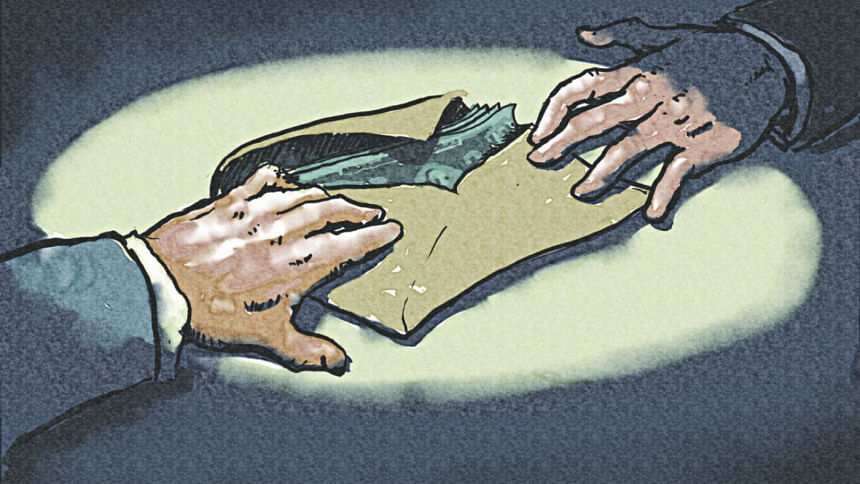Can't we outsmart the corrupt?

We need to outwit the graft-taker, outsmart him. In fact, we should try to be one step ahead of him so we can beat him in his own game! The reason why I am suggesting such an unconventional, even a little surrealistic method is simple and easy to understand.
A little realised rule of thumb is making a cake-walk into our society: "If you can't resist or overpower the corrupt, join him." In other words, give in to his pressure for bribe, otherwise your file will not move from his desk.
We have somehow developed a trait, a part of sub-culture, if you like, of treating ourselves more as consumers than citizens. We have a two-fold attitude of resignation to "fate." First, as hinted above, if you cannot stop something submit to it if you are not asking for trouble or courting denial. The second attitude of resignation is expressed by throwing up your arms in frustration and exclaiming, "Look and behold! others are greasing palms of people in authority as 'speed money' to get a favourable decision what then prevents you from following suit?" In a simulated market-place, the rules of demand and supply dictate just not unholy competition but unholy alliance as well.
A retired real estate business man confided to a friend that not only would graft be asked for, even an audacity could be shown to offer the name and phone number of his boss! That may reflect a certain in-cahoots factor or maybe a couldn't care less swagger.
Let me cite some reported instances where forceful pre-emptive steps could have stopped financial crimes from being full blown with a sure-fire evidence to punish the offender.
In the case of a police officer allegedly depositing money in small tranches over a period of time that in the end ran into two crores plus, the bank manager could have drawn a reference to his account holder on the source of his swelling deposits. Because there is anti-money laundering act to be invoked in case of unearned incomes.
E-tickets are the norm today, so that foreign airlines tend to inform the revenue of cash purchase of tickets, especially if this is done frequently.
When, however, the finance minister says to the effect that banks are rife with corruption and bad loans in cahoots with incompetent managements with political influence, he leaves little to imagination!
Let us separate positive signals from the negative ones that one can read from the corruption perception index (CPI) of the Transparency International (TI) released on February 22, 2018.
There are basically two pieces of good news: Our bettering by two steps from 15th position in 2016 to 17th in 2017 among the bottom pile of countries; the second positive news is about the consistent pattern of improvement.
After five consecutive years of ranking at the bottom of the list of the most corrupt countries between 2001 and 2005, we had no room to slide further down. The prospect of adding to an already overwhelming embarrassment to our image thankfully sank in. We went on to rank 3rd, 7th, 10th,13th, 12th, 13th, 16th, 14th, 13th and 15th before notching up 17th on the latest index. Barring some ups and downs, the pattern has been steady and rising.
I reckon we can modestly be pleased with having broken the jinx and found ourselves improving in terms of corruption perception. But rather than resting on our oars from any false sense of complacency, we must diligently apply the message that "the only way you can go now is up."
It is frustrating to note though, that we have taken 12 years to attain a score of 28 on a scale of 0-100. This is not even two-thirds of the desired bare minimum of 43. So, we have to fast-track implementation of a well-formulated graft containment strategy. To say that "the positive perception of the country's legal, institutional and policy structures" have been reflected on Bangladesh's improved ranking is a generalisation. Unpacking the statement, we find digitalisation, e-governance, e- tendering and purchase in public sector having made a difference in the situation. So, e-governance and digitalisation with their inherent features of averting cumbersome procedures which breed corruption cries out for implementation across sectors, public and private.
Another potential instrument for ensuring transparency and accountability in public services is the Right to Information (RTI) Act. Implementation of the Act is dependent on user-friendliness and spontaneous creation of demands for information. Awareness building can help in both areas with necessary fine-tuning in consultation with all stakeholders.
Two imperatives stare us in the face; ridding recruitment to vacant post of graft and bringing the big corruption cases to conclusion with conviction handed to the guilty.
This is an election year with new projects being put on the anvil. The highest-level committee formed to handle 80 percent of the purchases has its job cut out.
Shah Husain Imam is adjunct faculty at East West University, a commentator on current affairs and former Associate Editor, The Daily Star.
E-mail: [email protected]





Comments